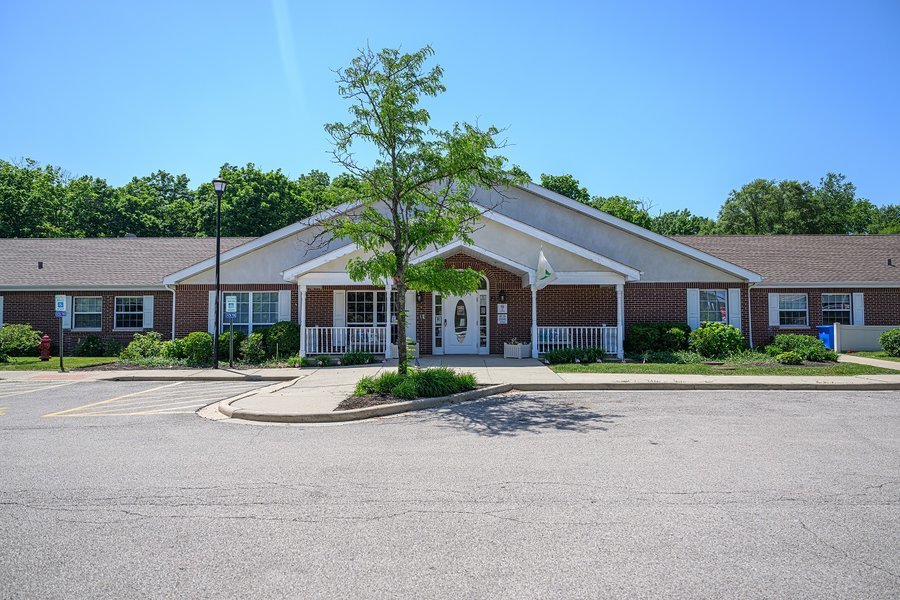





Featured Review
Anonymous115113650
5
|
November 16, 2015
Arden Courts of Northbrook was a really excellent place for Alzheimer's patients. The rooms were small but nice and clean. The staff that I met seemed very professional and very caring. They had sing-alongs. There were small dining areas in four different wings, so that the patients don't have to go far to eat. The staff know the patients and the patients know the staff. They're comfortable because they know where they are and what they're supposed to be doing, which is important for Alzheimer's patients.
Pricing for Arden Courts of Northbrook
About Arden Courts of Northbrook in Northbrook, Illinois
Developed nearly 30 years ago, Arden Courts provides a unique approach to caregiving and was created to help people living with memory loss enjoy residential living while receiving the professional assistance they need 24 hours a day. We understand dementia because memory care is all we do.
Arden Courts recognize that our residents have individual routines and interests, capabilities, and needs. We set out to accommodate their individuality beginning with an assessment by one of our professional staff members. Working with you, we develop an individualized care plan which is regularly adjusted to meet any changes in your loved ones routine or condition.
Our community was specially designed not only to be safe and secure but to instill a sense of home that enables our residents to remain as independent as possible. The layout of the community was designed to help your loved one stay as oriented as possible while maximizing their independence. Our safe and secure landscaped walking paths and courtyard areas allow residents to explore and be as active as they would like. Our engaging, success-oriented programming is scheduled throughout the day and is tailored to meet our residents abilities and interests.
When it comes to memory care, experience makes a difference. Contact us to arrange for your personal tour and discover how Arden Courts can make a difference in your loved ones life today.
To learn more about this providers license and review other available state reports, please visit:
Illinois Department of Public Health - Health Care Regulation
Connect with a Family Advisor for Free Expert Help
Get personalized recommendations
Unlock pricing info sitewide
Book tours to explore local options
Tell us about your situation
Who are you looking for?
Reviews of Arden Courts of Northbrook in Northbrook, Illinois
4.3
(3 reviews)
Anonymous115113650
5
|
November 16, 2015
Arden Courts of Northbrook was a really excellent place for Alzheimer's patients. The rooms were small but nice and clean. The staff that I met seemed very professional and very caring. They had sing-alongs. There were small dining areas in four different wings, so that the patients don't have to go far to eat. The staff know the patients and the patients know the staff. They're comfortable because they know where they are and what they're supposed to be doing, which is important for Alzheimer's patients.
Caring82790150
5
|
October 3, 2014
I do have my wife in Arden Courts. Why did I pick this place? Partly because of all information I received from it and the feedback I got from other people who used it, saying they were very pleased with it, so I thought that it was a very good place. The staff is very good. We're really happy with the staff. They are very caring and very concerned. They're very good. My wife is really well cared for. Food is very adequate. It is very good. They do a lot of games. They have programs. They bringing people in for concerts. They do different kinds of word games as well as bean toss and a number of other kinds of games. They have music and movement kinds of things. They do walking. There is a variety of activities. What I like best about this place? I think it is the personality and the care that my wife receives there. She seems very content. I would recommend Arden Courts, certainly!
commercesd
3
|
July 11, 2011
We visited the Arden Courts facility as a possibility for our great aunt to live in. We were immediately struck by the charming way that the structure was designed. It really seems like a country inn that you might find on a lane outside of the city. Yet, it is convenient to Chicago as a suburb. Our great aunt has early on-set Alzheimer's so we were impressed that the facility seems to bear in mind that some of its residents may have that challenge. Its secure location is pleasant and easy to navigate. The staff does regular rounds all around the grounds to ensure the safety of the residents. This is very important to us. The food we sampled was acceptable, but nothing really stood out. Having been spoiled at a number of city located facilities that mirror 4 and 5 star restaurants, we could see that the type of meal that Arden Courts provides would most likely never approach those other places. There was nothing bad about the food; it was simply not extraordinary in any way. There is an adequate variety of activities, however, if someone really needs a lot of stimulation such as what you might find in the city, this place would not suit their needs. But for someone looking more toward quality and level of care, Arden Courts would certainly fit the bill. We are still making our decision, and because of the high level of care, it is on our list to consider. At this stage, we are evaluating the level of our great-aunt's dementia, to determine if she needs this level of care at point this time.
Services and Amenities of Arden Courts of Northbrook in Northbrook, Illinois
Diet & Nutrition
- Diabetic
- Low Fat
- Low Salt
- Renal
- Vegetarian Diet Available
- Special Diets/Dietary Accommodations
- Dietary services
- Chef on staff
- Dietitian-Approved Meals
Fitness & Wellness Programs
- Salon Services
- Yoga/Stretching opportunities
- Balance activities/programs
- Brain fitness activities
- Chair fitness
- Group exercise
- Fitness Opportunities
- Life enrichment activities/programs
Health Services
- Companion Care
- Hospice Care
- In Home Health Care
- Pharmacy on-site
- Psychiatric Care
- Medication Reminders
- Immunizations
- Memory Care
- Podiatry
Languages
- English spoken
- Spanish Spoken
- Tagalog spoken
Personal Care
- Personal Care Assistants
- Cooking services
- Administer Medication
- Bathing Assistance
- Cueing & Redirection
- Dressing Assistance
- Feeding Assistance
- Grooming Assistance
- Meal Preparation
- Shaving Assistance
- Toileting Assistance
- Urinary Incontinence Care
Specialized Staff
- Nurse on Staff (Part time)
Ambulatory Assistance & Accessibility
- Accessible apartments
- Accessible Facilities
- Mobility & Wheelchair Assistance
- No Hoyer Lift
- Transfer Assistance
- Two-Person Transfer Assistance
- Wheelchair Accessible Facilities
Dining
- Communal Dining
- Guest Meals
- Beverages provided
- Flexible food options
- Meals provided
- Snacks provided
Games Hobbies & Recreation
- Arts & Crafts Activities/Programs
- Literary Activities/Programs
- Educational Activities/Programs
- Music Activities/Programs
- Facilitated Field Trips/Outings
- Tabletop & Other Games/Programs
- Horticultural Activities
- Entertainment activities/programs
- No woodworking
- Organized activities/programs
- Seasonal, holiday, and themed events
- Social Activities/Events
- Spiritual activities/programs
- Sports & lawn games
Housekeeping & Maintenance
- Housekeeping Services
- Laundry Services
- Linen Services
- Bed Making Services
- Maintenance & Repair Services
- Private Housekeeping Services
On-Site Services
- Religious Services
- Shabbat services
- Catholic Services
- Church services
- Long-term insurance assistance
Room Amenities
- Wifi/Internet In Unit
- Cable/Satellite In Unit
- Closet Space In Unit
- Individual Climate Controls
- Furnished Units
- No Kitchen in unit
Therapies
- Occupational Therapy/Rehabilitation
- Physical Therapy/Rehabilitation
- Speech Therapy/Rehabilitation
- Support Groups
Campus/Building Details
- Convenient location
- Flexible Visitation Hours
- House setting
- Scenic views
- Single-floor building
- Smoking Not Allowed
Financing & Payment Options
- Accepts Check Payments
- All Inclusive Rent
- Accepts Credit Card Payments
- Medicaid Not Accepted
- Medicare Not Accepted
Guests
- Guest Parking
Inside Amenities
- Entertainment Venues
- Cable/Satellite TV in Common Area
- Performance venues
- Shared Common Areas
Outside Amenities
- Garden
- Enclosed/Secured outdoor common areas
- Walking and Hiking Areas
Safety & Security
- Gated Facility
- Controlled Building Access
Resident Information
- Offers Respite Care
Staff Training & Qualifications
- Male Caregivers
Additional Amenity Information
- Housing: Private Rooms and semi- private rooms
- Special Comment: We have a walking path that winds through our building, and along the outside of our building, offering 1/3 mile of walking path that is secured from all sides. Our residents and their families absolutely love this!
- State Licenses: Illinois
Costs for Arden Courts of Northbrook in Northbrook, Illinois

Memory Care
$9,000
Starting Price
Request a Tour
Thu
5
Mar
Fri
6
Mar
Sat
7
Mar
Sun
8
Mar
Mon
9
Mar
Tue
10
Mar
Wed
11
Mar
Thu
12
Mar
Fri
13
Mar
Sat
14
Mar
Sun
15
Mar
Mon
16
Mar
Tue
17
Mar
Wed
18
Mar
Select Tour Time
Help seniors by writing a review
If you have firsthand experience with a community or home care agency, share your review to help others searching for senior living and care.
Frequently Asked Questions
More Senior Living Nearby
Estimate your senior living budget
What you can do with Caring
Didn't find what you were looking for?
Caring's Family Advisors can help answer your questions, schedule tours, and more.
Helpful Articles
Senior Living near Northbrook, IL
Senior Living near Cook County, IL
Other options in Northbrook, IL
Senior Living Advisor
How can I help?
How can
I help?





















